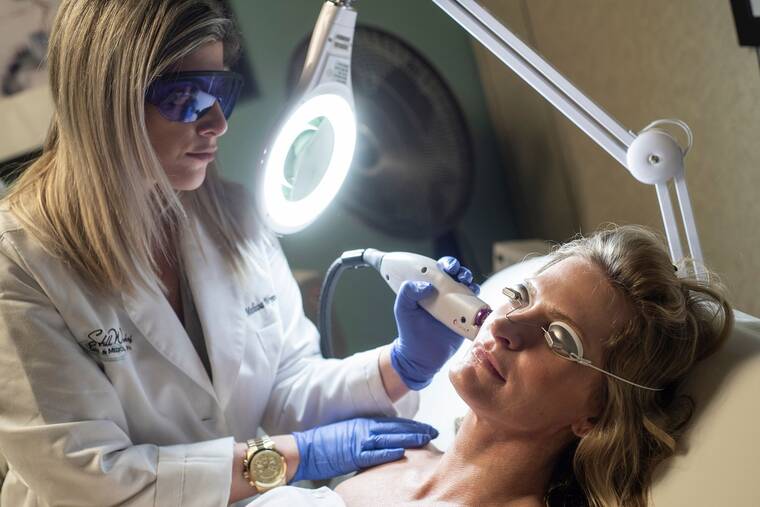Copyright staradvertiser

Question: Lately I’ve noticed quite a few new “med spas” popping up, not just in my neighborhood but around the island. I recently tried one that advertised a specialized laser treatment for dark facial pigmentation (melasma). Despite spending $4,400 for 10 laser treatments, the dark spots worsened. I expressed my dissatisfaction to the owner, but my concerns were met with no resolution. The owner of the med spa is described on her website as a “medical grade esthetician” without specifying the qualifications or source of that credential. Her official license with the state is listed as “beauty operator.” Are these med spas monitored to ensure they are delivering outcomes that justify their high price tags? I’m concerned about their safety and effectiveness given an apparent lack of oversight and exaggerated claims of beauty enhancement on social media. I want to prevent others from experiencing what I went through. Is there any recourse for consumers in this situation? Answer: Neither the state Department of Commerce and Consumer Affairs nor the state Department of Health routinely monitor med spa businesses, according to spokespersons from each department, but the DCCA does oversee licensing for beauty operators and many other lines of work (including doctors and other medical professionals). You can file a complaint with the DCCA’s Regulated Industries Complaints Office asking whether the beauty operator violated the terms of her license, including perhaps by practicing medicine without a license, a spokesperson said. Complaints can be filed online via links at cca.hawaii.gov/rico or by calling the DCCA Consumer Resource Center at 808-587-4272. If RICO takes up your complaint, it would not represent you personally, but investigate on behalf of the public health, welfare and safety. “As for the consumer trying to obtain money back, that would be a civil matter which the consumer may take up in the appropriate civil court. Consulting an attorney of the consumer’s choice for guidance and advice is a decision for the consumer to make,” William Nhieu, a DCCA spokesperson, said in an email. You said the person who treated you for melasma is a licensed beauty operator but describes herself as a medical grade esthetician. According to the American Med Spa Association, the latter is not an official title and may give customers a false impression that the person is licensed to perform medical treatments. Under state law (Hawaii Revised Statutes 439A), a beauty operator fills one of four license categories: cosmetologist, hairdresser, esthetician or nail technician. The law says a cosmetologist is licensed to be paid as a hairdresser, esthetician and nail technician. A licensed esthetician may “with hands or nonmedically prescribed mechanical or electrical apparatus or devices or by use of cosmetic preparations, antiseptics, tonics, lotions, or creams” be paid for: >> “Massaging, cleansing, stimulating, manipulating, exercising, beautifying, or doing similar work on the scalp, face, neck, hands, arms, bust, upper part of the body, legs, or feet; >> “Cleansing, exfoliating, wrapping, or doing similar work upon the entire body, without direct contact by the hands and utilizing gloves, loofah mitts, or brushes; or >> “Removing superfluous hair about the body of any person by means other than electrolysis.” (Electrologists need a separate license). Estheticians can own med spas in Hawaii, but must only perform services within the scope of their license, according to Nextech, a company that provides management software for medical spas. Nonmedical owners may employ medical professionals licensed to perform procedures they cannot do themselves, it said. For years, the American Society for Dermotologic Surgery Association has advocated for stricter oversight of med spas nationwide, saying that “lack of regulation and enforcement has enabled a large number of medical spas to offer medical procedures by inadequately trained or supervised persons to an unsuspecting public.” The association, comprising board-certified dermatologists, said devices such as lasers and energy-based devices are regulated as medical devices by the Food and Drug Administration and “should be used only by a physician or adequately trained medical professionals under the supervision of a physician.” It encourages states to adopt model legislation, the Medical Spa Safety Act, to ensure facilities deliver safe medical care supervised by an on-site physician. Find the group’s tips for patients, including those considering treatment for melasma; policy guidance; and a link to the model legislation at 808ne.ws/4qGx294. I just read about Operation Shine the Light recovering 10 missing children and youth, according to the Hawaii Department of the Attorney General and Department of Human Services. Bless them for their work to save our vulnerable keiki. — Phyllis Thanksgiving column All are welcome to submit short expressions of gratitude for Kokua Line’s special Thanksgiving Day Mahalo column, an annual tradition that highlights the many ways people make life better for one other and the wider world. Whether thanking a friend or a stranger, share your good news and the aloha spirit. Emailed submissions are preferred, to kokualine@staradvertiser.com. Write to Kokua Line at Honolulu Star-Advertiser, 500 Ala Moana Blvd., Suite 2-200, Honolulu, HI 96813; call 808-529-4773; or email kokualine@staradvertiser.com.



